Osgood schlatter disease - Study guides, Class notes & Summaries
Looking for the best study guides, study notes and summaries about Osgood schlatter disease? On this page you'll find 946 study documents about Osgood schlatter disease.
Page 2 out of 946 results
Sort by
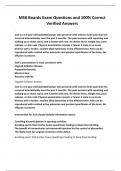
-
MSK Boards Exam Questions and 100% Correct Verified Answers
- Exam (elaborations) • 25 pages • 2024
- Available in package deal
-
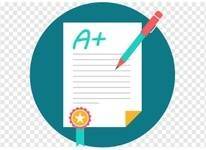 Examsplug
Examsplug
-
- $13.49
- + learn more
osh is a 14-year-old basketball player who presents with anterior knee pain that has occurred intermittently over the past 3 months. The pain worsens with squatting and walking up or down stairs, and is better with rest. He denies fever, weight loss, joint redness, or skin rash. Physical examination reveals a Tanner 3 male in no acute distress with a tender, swollen tibial tuberosity in the affected knee. Pain can be reproduced with resisted active extension and passive hyperflexion of the ...
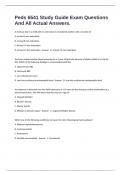
-
Peds 6541 Study Guide Exam Questions And All Actual Answers.
- Exam (elaborations) • 14 pages • 2024
- Available in package deal
-
 TestSolver9
TestSolver9
-
- $10.09
- + learn more
A mantoux test in a child with no risk factors is considered postiive with a reaction of A. at least 5 mm induration B. at least 8 mm induration C. At least 10 mm induration D. at least 15 mm induration - Answer D. at least 15 mm induration You have ordered routine blood screening for a 2 year old girl who because of dietary habits is at risk for IDA. Which of the following findings is not associated with IDA. A. Hypochromic RBC B. Microcytic RBC C. Low reticulocyte count D. Low fr...
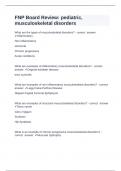
-
FNP Board Review Questions with complete solution
- Exam (elaborations) • 14 pages • 2024
- Available in package deal
-
 Academia199
Academia199
-
- $13.49
- + learn more
FNP Board Review Questions with complete solution What are the types of musculoskeletal disorders? - correct answer Inflammatory Non inflammatory structural Chronic progressive Acute conditions What are examples of inflammatory musculoskeletal disorders? - correct answer Osgood-schlatter disease toxic synovitis What are examples of non inflammatory musculoskeletal disorders? - correct answer Legg-Calve-Perthes Disease Slipped Capital Femoral Ephiphysis What are examples of s...
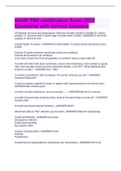
-
AANP FNP certification Exam 2023 Questions with correct Answers
- Exam (elaborations) • 21 pages • 2023
- Available in package deal
-
millyphilip
-
- $10.99
- 4x sold
- + learn more
All diastolic murmurs are pathological. Murmurs Grades I-barely II-audible III- clearly audible. IV- first time thrill V-Steth edge VI-entire steth. EXAM - ANSWER-III first time audible, IV first time thrill Fundal height 12 weeks - ANSWER-Fundal Height 12 weeks above symphysis pubis. EXAM Fundus 16 weeks between symphysis pubis and umbilicus. Fundus at 20 weeks is at umbilicus. 2 cm more of less from # of wk gestation is normal if more or less order US 3 month old infant with down...
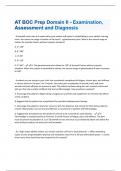
-
AT BOC Prep Domain II - Examination, Assessment and Diagnosis Questions & Answers Solved 100% Correct!!
- Exam (elaborations) • 97 pages • 2024
- Available in package deal
-
 PatrickKaylian
PatrickKaylian
-
- $7.99
- + learn more
. A baseball coach who is 6 weeks status post rotator cuff repair is rehabilitating in your athletic training room. You assess the range of motion of the coach ' s glenohumeral joint. What is the normal range of motion for shoulder flexion without scapular elevation? A. 0°-120° B. 0°-180° C. 0°-90° D. 0°-135° E. 0°-160° - A: The glenohumeral joint allows for 120° of forward fl exion without scapular elevation. When the scapula is permitted to elevate, the normal range of glen...
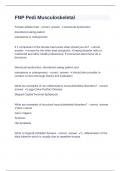
-
FNP Pedi Musculoskeletal Question and answers 100% correct
- Exam (elaborations) • 13 pages • 2024
- Available in package deal
-
 Academia199
Academia199
-
- $14.99
- + learn more
FNP Pedi Musculoskeletal Question and answers 100% correct FNP Pedi Musculoskeletal Female athlete triad - correct answer menstrual dysfunction disordered eating pattern osteopenia or osteoporosis If 1 component of the female triad exists what should you do? - correct answer screen for the other triad symptoms. If eating disorder refer to nutritionist and other health professional. If concerned about bone do a dexascan. Menstrual dysfunction, disordered eating pattern and osteo...
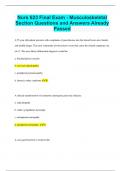
-
Nurs 623 Final Exam - Musculoskeletal Section Questions and Answers Already Passed
- Exam (elaborations) • 31 pages • 2024
- Available in package deal
-
 BrilliantScores
BrilliantScores
-
- $10.49
- + learn more
Nurs 623 Final Exam - Musculoskeletal Section Questions and Answers Already Passed A 55 year old patient presents with complaints of paresthesias into the lateral lower arm, thumb, and middle finger. The most commonly involved nerve roots that cause the related symptoms are c6-c7. The most likely differential diagnosis would be: a. brachial plexus neuritis b. cervical radiculopathy c. peripheral polyneuropathy d. thoracic outlet syndrome B. A clinical manifestation of symmetric n...
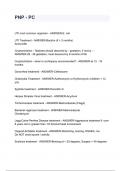
-
PNP - PC QUESTIONS WITH CORRECT ANSWERS
- Exam (elaborations) • 35 pages • 2024
- Available in package deal
-
 ACTUALSTUDY
ACTUALSTUDY
-
- $7.99
- + learn more
PNP - PC UTI most common organism - ANSWER-E. coli UTI Treatment - ANSWER-Bactrim (if > 2 months) Amoxicillin Cryptorchidism - Testicles should descend by - gestation, if not by - - ANSWER-28 - 36 gestation; most descend by 6 months of life Cryptorchidism - when is orchiopexy recommended? - ANSWER-at 12 - 18 months Gonorrhea treatment - ANSWER-Ceftriaxone Chlamydia Treatment - ANSWER-Azithromycin or Erythromycin (children < 12 y/o) Syphilis treatment - ANSWER-Penicillin G Herpe...
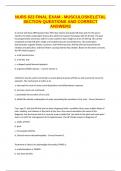
-
NURS 623 FINAL EXAM - MUSCULOSKELETAL SECTION QUESTIONS AND CORRECT ANSWERS
- Exam (elaborations) • 18 pages • 2024
-
 Winfred
Winfred
-
- $11.49
- + learn more
A 13-year-old obese (BMI greater than 95%) boy reports low-grade left knee pain for the past 2 months. He denies antecedent trauma but admits to frequent horseplay with his friends. The pain has progressively worsened, and he is now unable to bear weight at all on his left leg. His current complaints include left groin, thigh, and medial knee pain and tenderness. His examination demonstrates negative Drawer, Lachman, and McMurray tests; left hip with decreased internal rotation and abduction; an...
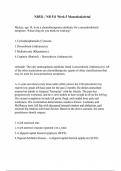
-
NR511 / NR 511 Week 5 Musculoskeletal
- Exam (elaborations) • 29 pages • 2024
- Available in package deal
-
 Kingamor
Kingamor
-
- $12.00
- + learn more
Mickey, age 18, is on a chemotherapeutic antibiotic for a musculoskeletal neoplasm. Which drug do you think he is taking? 1.Cyclophosphamide (Cytoxan). 2.Doxorubicin (Adriamycin). 3.Methotrexate (Rheumatrex). 4.Cisplatin (Platinol). - Doxorubicin (Adriamycin). rationale: The only antineoplastic antibiotic listed is doxorubicin (Adriamycin). All of the other medications are chemotherapeutic agents of other classifications that may be used for musculoskeletal neoplasms. A 13-year-old obes...

That summary you just bought made someone very happy. Also get paid weekly? Sell your study resources on Stuvia! Discover all about earning on Stuvia


